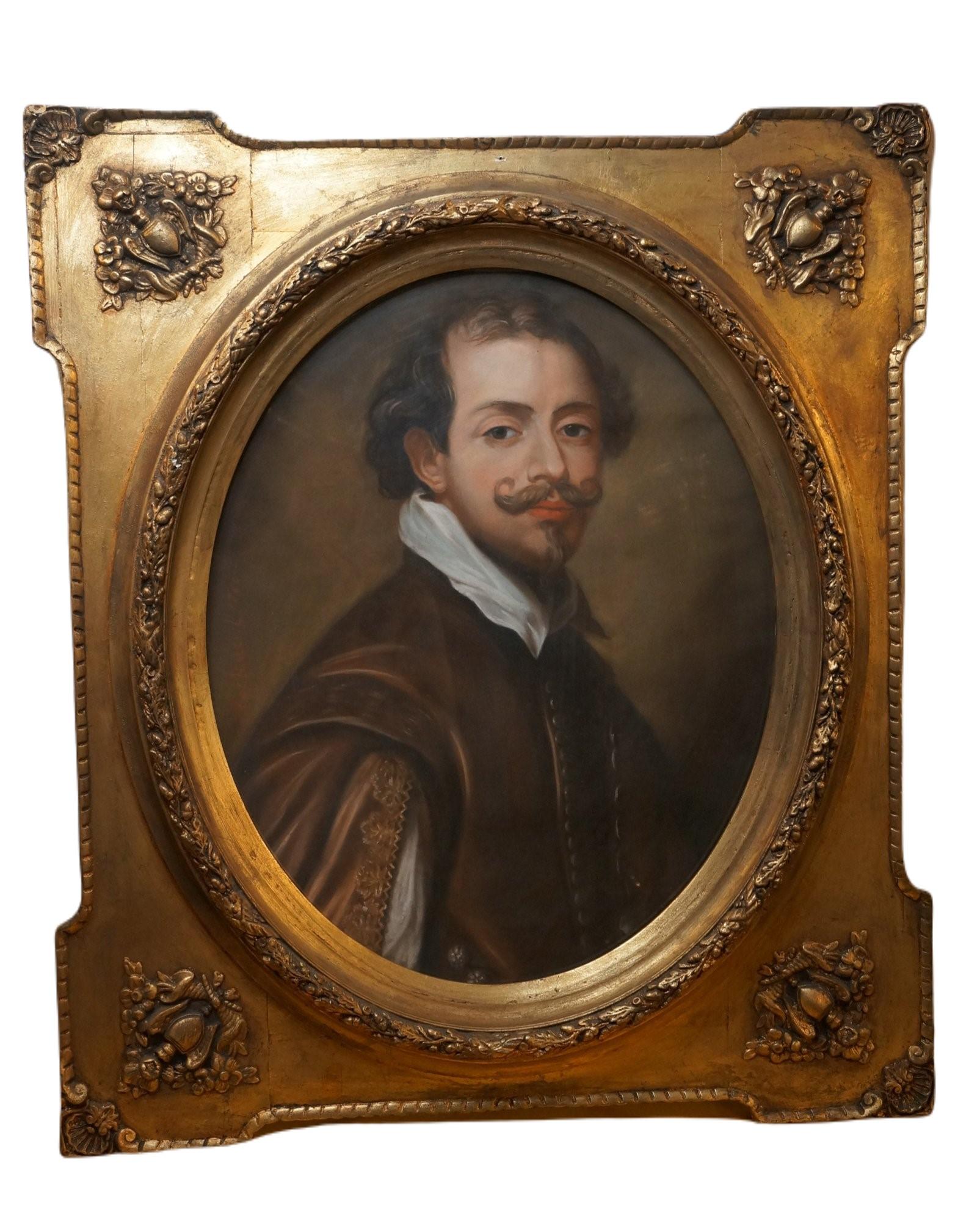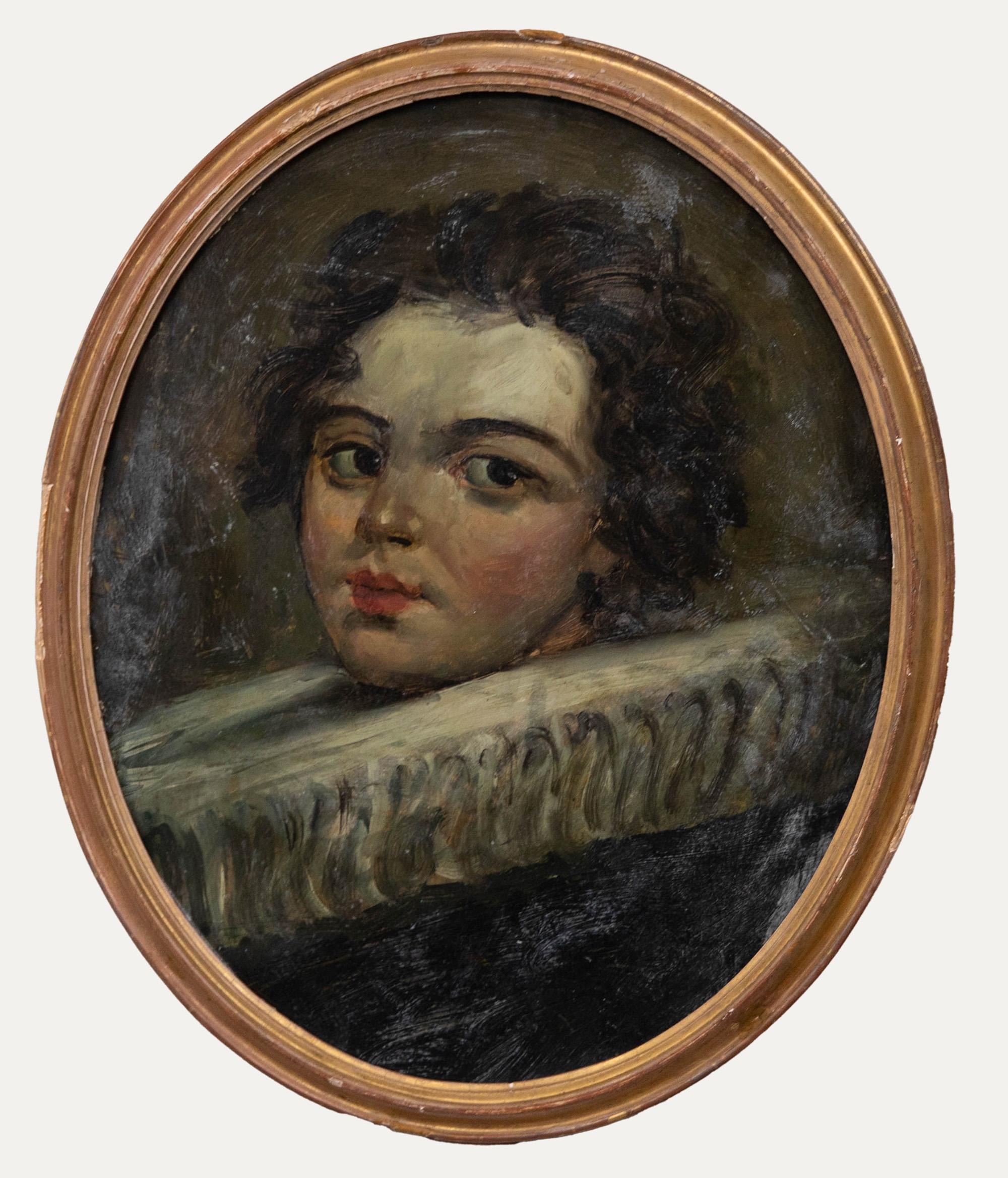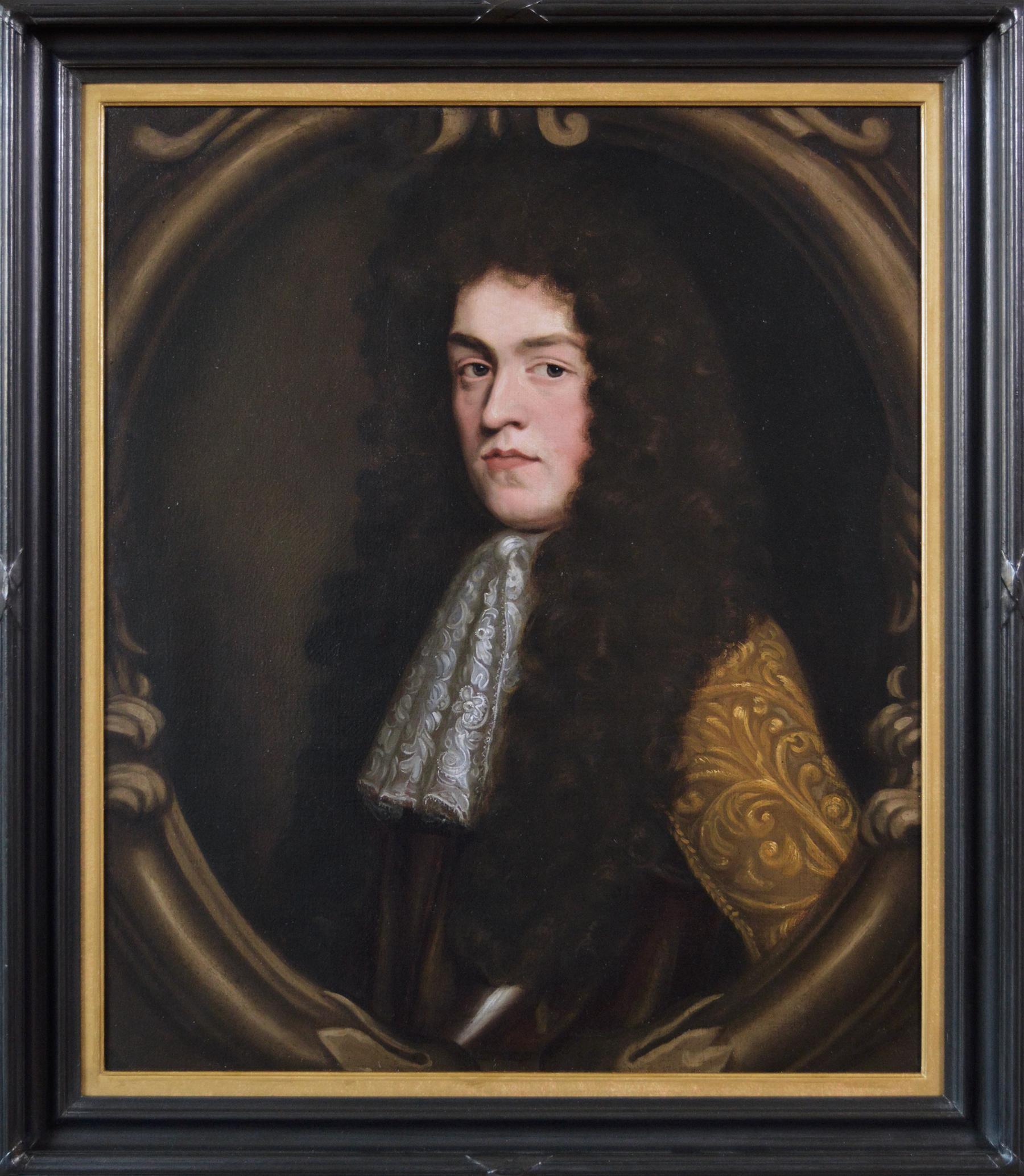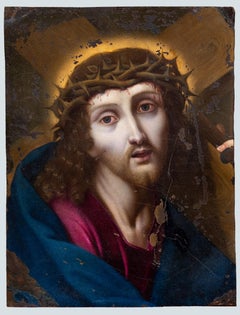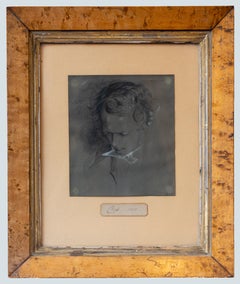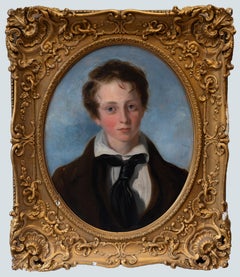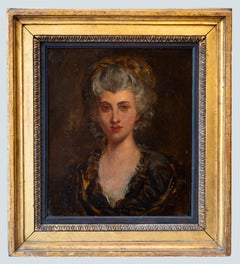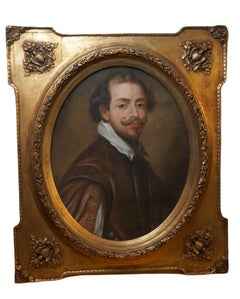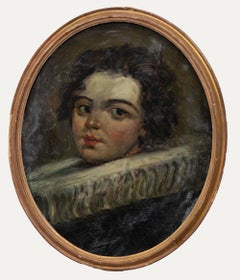Items Similar to Portrait of Charles II of Spain
Want more images or videos?
Request additional images or videos from the seller
1 of 4
Portrait of Charles II of Spain
$1,885.09
£1,400
€1,650.90
CA$2,611.54
A$2,929.02
CHF 1,533.88
MX$35,590.39
NOK 19,477.71
SEK 18,466.24
DKK 12,323.12
About the Item
Title: Portrait of Charles II of Spain
Artist: Unknown
Date: Late 17th century
Medium: Oil on copper
Framing: Set against red velvet in a deeply carved and distressed giltwood frame, likely of the same period
This finely detailed miniature, executed in oil on copper, is attributed to the Spanish School of the 17th century and likely represents Charles II of Spain (1661–1700), the last Habsburg monarch of the Spanish Empire. The sitter’s unmistakable features — the prominent Habsburg jaw, elongated face, and melancholy expression — strongly support this identification, aligning with known portraits of the king painted during his reign.
Created during a period when miniature portraits served as personal tokens or diplomatic gifts among European courts, the work reflects the Baroque sensibility of the Spanish court: subdued, dignified, and precise. The painter has skillfully captured the sitter’s fragile presence and royal bearing with fine, meticulous brushwork, characteristic of Spanish portraiture of the time.
The portrait is presented on a rich red velvet mount, framed within a heavily ornamented and naturally aged giltwood frame, likely original to the piece. The surface wear and flaking visible on the painting further attest to its age and authenticity.
This miniature offers a rare and intimate view of Charles II, a monarch whose reign marked the twilight of the Spanish Habsburg dynasty — a haunting and historically poignant depiction from the high Baroque period of Spanish art.
Miniature measurements without frame: 4.5cm x 3.5cm
About the Seller
New to 1stDibs
Joined in the past six months.
No Reviews Yet
Vetted Professional Seller
Every seller passes strict standards for authenticity and reliability
1stDibs seller since 2025
Typical response time: 3 hours
- ShippingRetrieving quote...Shipping from: London, United Kingdom
- Return Policy
Authenticity Guarantee
In the unlikely event there’s an issue with an item’s authenticity, contact us within 1 year for a full refund. DetailsMoney-Back Guarantee
If your item is not as described, is damaged in transit, or does not arrive, contact us within 7 days for a full refund. Details24-Hour Cancellation
You have a 24-hour grace period in which to reconsider your purchase, with no questions asked.Vetted Professional Sellers
Our world-class sellers must adhere to strict standards for service and quality, maintaining the integrity of our listings.Price-Match Guarantee
If you find that a seller listed the same item for a lower price elsewhere, we’ll match it.Trusted Global Delivery
Our best-in-class carrier network provides specialized shipping options worldwide, including custom delivery.More From This Seller
View AllEcce Homo, after Carlo Dolci (1616–1686)
Located in London, GB
Ecce Homo is a superb, striking and emotive Old Master in oil on copper after the renowned Italian Baroque artist Carlo Dolci. The "Ecce Homo" shows the figure of Christ before His c...
Category
17th Century Baroque Figurative Paintings
Materials
Copper
Portrait of Steuart Adolphus PEARS
Located in London, GB
A finely executed charcoal portrait on paper depicting Steuart Adolphus Pears, thought to have been painted in “Harrow 1849”.
Pears, noted for his tenure as headmaster of Repton Sc...
Category
19th Century Portrait Paintings
Materials
Paper, Charcoal
Portrait of a boy, English School 19th century
Located in London, GB
This charming 19th-century portrait, painted in the manner of the English School, depicts a young boy set against a soft sky-blue background, lending the composition a gentle luminos...
Category
19th Century Portrait Paintings
Materials
Canvas, Oil
Portrait of a lady, Elizabeth Ann Sheridan (née Linley; Sep 1754 - Jun 1792)
Located in London, GB
This refined portrait is believed to depict Elizabeth Ann Sheridan (née Linley; 1754–1792), the celebrated English soprano and wife of playwright Richard Brinsley Sheridan. Painted i...
Category
Late 18th Century Portrait Paintings
Materials
Canvas, Oil
Chinese portrait of a gentleman from the court
By 19th Century Chinese school
Located in London, GB
The painting is executed with meticulous precision on delicate rice paper, typical of Chinese export art produced for Western collectors in the 18th or 19th century. Its composition ...
Category
19th Century Figurative Paintings
Materials
Gouache, Rice Paper
Portrait of a woman, signed "Frank Jameson" in the back (1898-1968)
By Frank Jameson
Located in London, GB
This finely rendered pencil drawing by British artist Frank Jameson depicts a contemplative female sitter in three-quarter view. Executed with delicate, confident linework and subtle...
Category
20th Century Portrait Paintings
Materials
Paper, Pencil
You May Also Like
Portrait of a well-to-do gentleman
Located in DEVENTER, NL
Portrait of a well-to-do gentleman in pastel on parchment.
Signed left: Marteau L. 1760.
French School, possibly by Louis Marteau (1715 – 1804)
In a gilded 19th century frame.
Dimen...
Category
18th Century Portrait Paintings
Materials
Parchment Paper, Pastel
Portrait Philip V King Rigaud Paint Oil on canvas 17/18th Century Old master Art
Located in Riva del Garda, IT
Hyacinthe Rigaud (Perpignan 1659 - Paris 1743) Circle
Portrait of Philip V, King of Spain (Versailles 1683 - Madrid 1746)
Oil on canvas
72 x 59 cm - framed 87 x 74 cm.
The painting examined here, depicting King Philip V of Spain (Perpignan 1659 - Paris 1743), is to be placed in the circle of the painter Hyacinthe Rigaud (Perpignan 1659 - Paris 1743), one of the most significant portrait painters of his time and a great interpreter of the French school.
This is a work of excellent pictorial quality: note the rendering of the facial features and the sharpness of the contours emphasised by the light. The face is characterised by chiaroscuro passages that verisimilarly reproduce light and its effects, rendered with great skill.
Philip V wears a black satin costume with a sword at his side, he wears the stiff white Spanish collar and at the same time wears the blue sash of the Order of the Holy Spirit and the collar of the Habsburg Order of the Golden Fleece: this bringing together of the two main orders of France and Spain announced the possibility of a union between the two crowns.
In Spanish costume, this effigy is nevertheless fully in line with the French tradition of ceremonial portraiture, also testifying to the renewal that Rigaud had brought about, particularly through the relationship between the character and the splendour of the decoration.
The work is inspired, reworked in a reduced format to make it suitable for a private clientele, by the large painting that Rigaud made for the sovereign around 1700, today conserved in the Louvre, reproduced by the same workshop in numerous other versions.
The account books...
Category
17th Century Old Masters Paintings
Materials
Oil
$7,267 Sale Price
20% Off
A Portrait of a Gentleman, thought to be Moses Diego Lopez Pereira
Located in London, GB
Austrian School, 18th Century
A Portrait of a Gentleman, thought to be Moses Diego Lopez Pereira, 1st Baron d’Aguilar, in an elaborate coat and a powdered wig
Oil on canvas
Provena...
Category
18th Century Paintings
Materials
Canvas, Oil
19th Century Oil - Portrait of a Prince
Located in Corsham, GB
In the style of the Old Masters. Unsigned. Presented in an oval gilt frame. On board.
Category
19th Century Portrait Paintings
Materials
Oil
$428 Sale Price
20% Off
17th Century portrait oil painting of a gentleman
By Willem Wissing
Located in Nr Broadway, Worcestershire
Circle of Willem Wissing
Dutch, (1656-1687)
Portrait of a Gentleman
Oil on canvas
Image size: 29 inches x 24.5 inches
Size including frame: 35 inches x...
Category
17th Century Portrait Paintings
Materials
Canvas, Oil
Portrait of William Herbert, 3rd Earl of Pembroke, Early 17th Century Portrait
Located in London, GB
English School, (circa 1600)
Portrait of William Herbert, 3rd Earl of Pembroke
Oil on panel, oval
Image size: 29¼ x 23⅞ inches
Painted wooden frame
Provenance:
176, Collection of Francis Greville, 1st Earl of Warwick.
The Trustees of the Lord Brooks’ Settlement, (removed from Warwick Castle).
Sotheby’s, London, 22nd March 1968, lot 81.
Painted onto wooden panel, this portrait shows a dark haired gentleman in profile sporting an open white shirt. On top of this garments is a richly detailed black cloak, decorated with gold thread and lined with a sumptuous crimson lining. With the red silk inside it’s all very expensive and would fall under sumptuary laws – so this is a nobleman of high degree.
It’s melancholic air conforms to the contemporary popularity of this very human condition, evident in fashionable poetry and music of the period. In comparison to our own modern prejudices, melancholy was associated with creativity in this period.
This portrait appeared in the earliest described list of pictures of Warwick castle dating to 1762. Compiled by collector and antiquary Sir William Musgrave ‘taken from the information of Lord & Lady Warwick’ (Add. MSS, 5726 fol. 3) is described;
‘8. Earl of Essex – an original by Zuccharo – seen in profile with black hair. Holding a black robe across his breast with his right hand.’
As tempting as it is to imagine that this is a portrait of Robert Devereux, the 2nd Earl Essex, we might take this with a pinch of salt. Its identification with this romantic and fatal Elizabethan might well have been an attempt to add romance to Warwick Castle’s walls. It doesn’t correspond all that well with Essex’s portraits around 1600 after his return from Cadiz. Notably, this picture was presumably hung not too far away from the castle’s two portraits of Queen Elizabeth I. The first, and undoubtedly the best, being the exquisite coronation portrait that was sold by Lord Brooke in the late 1970s and now hangs in the National Portrait Gallery. The second, described as being ‘a copy from the original at Ld Hydes’, has yet to resurface.
The portrait eventually ended up being hung in the State Bedroom of Warwick Castle.
Archival documents present one other interesting candidate. The Greville family’s earliest inventory of paintings, made in 1630 at their home Brooke House in Holborn, London, describes five portraits of identified figures. All five belonged to the courtier, politician and poet Sir Fulke Greville (1554-1628), 1st Baron Brooke, and were hung in the ‘Gallerie’ of Brooke House behind yellow curtains. One of them was described as being of ‘Lord of Pembrooke’, which is likely to have been William Herbert (1580-1630), 3rd Earl of Pembroke. William was the eldest son of Greville’s best friend’s sister Mary Sidney, and was brought up in the particularly literary and poetically orientated household which his mother had supported. Notably, the 3rd Earl was one of the figures that Shakespeare’s first folio was dedicated to in 1623.
The melancholic air to the portrait corresponds to William’s own pretensions as a learned and poetic figure. The richness of the robe in the painting, sporting golden thread and a spotted black fabric, is indicative of wealth beyond that of a simple poet or actor. The portrait’s dating to around the year 1600 might have coincided with William’s father death and his own rise to the Pembroke Earldom. This period of his life too was imbued with personal sadness, as an illicit affair with a Mary Fitton had resulted in a pregnancy and eventual banishment by Elizabeth I to Wilton after a short spell in Fleet Prison. His illegitimate son died shortly after being born. Despite being a close follower of the Earl of Essex, William had side-stepped supporting Devereux in the fatal uprising against the Queen and eventually regained favour at the court of the next monarch James I.
His linen shirt is edged with a delicate border of lace and his black cloak is lined on the inside with sumptuous scarlet and richly decorated on the outside with gold braid and a pattern of embroidered black spots.
Despite the richness of his clothes, William Herbert has been presented in a dishevelled state of semi-undress, his shirt unlaced far down his chest with the ties lying limply over his hand, indicating that he is in a state of distracted detachment. It has been suggested that the fashion for melancholy was rooted in an increase in self-consciousness and introspective reflection during the late 16th and early 17th centuries.
In contemporary literature melancholy was said to be caused by a plenitude of the melancholy humor, one of the four vital humors, which were thought to regulate the functions of the body. An abundance of the melancholia humor was associated with a heightened creativity and intellectual ability and hence melancholy was linked to the notion of genius, as reflected in the work of the Oxford scholar Robert Burton, who in his work ‘The Anatomy of Melancholy’, described the Malcontent as ‘of all others [the]… most witty, [who] causeth many times divine ravishment, and a kind of enthusiamus… which stirreth them up to be excellent Philosophers, Poets and Prophets.’ (R. Burton, The Anatomy of Melancholy, London, 1621 in R. Strong, ‘Elizabethan Malady: Melancholy in Elizabethan and Jacobean Portraits’, Apollo, LXXIX, 1964).
Melancholy was viewed as a highly fashionable affliction under Elizabeth I, and her successor James I, and a dejected demeanour was adopted by wealthy young men, often presenting themselves as scholars or despondent lovers, as reflected in the portraiture and literature from this period. Although the sitter in this portrait is, as yet, unidentified, it seems probable that he was a nobleman with literary or artistic ambitions, following in the same vain as such famous figures as the aristocratic poet and dramatist, Edward de Vere...
Category
Early 17th Century Old Masters Portrait Paintings
Materials
Oil, Wood Panel
More Ways To Browse
Antique Spanish Art
Antique Spanish Frames
Antique Copper Frame
Antique Spanish Oil Painting
17th Century Copper
Antique Portrait Miniature
Spanish Baroque Art
Spanish Baroque Frame
Antique Copper Ornaments
Spanish Copper Antique
Puritan Oil Painting
Robert Eric Moore
Robert Menzies
Roni Stretch
Zhang Bo
1860 Oil Painting Of Woman In Black Dress
Barkley Hendricks
Battle Of Boyne
